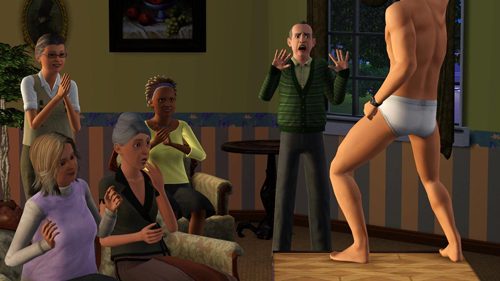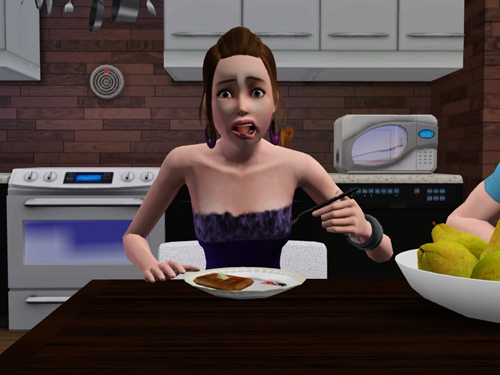制作人称玩家所创造的故事是游戏趣味之所在
游戏邦注:本文原作者是《模拟人生3:野心》(The Sims: Ambitions)手机版游戏的制作人Christopher Aaby,他认为让玩家自主设想游戏故事情节,可以极大增加游戏的可玩性。
首先我要说这篇文章中的观点会带有个人色彩,因为我曾经是《模拟人生3:野心》的制作人;另一方面,从某些原因上讲,我认为这些观点也有事实根据的。实现你想要的,而我也做好迎接不同观点的准备。
我想说:模拟人生真的太棒了!一开始我并不感冒,这有什么好玩的?这款游戏到底有所谓的输赢吗?它真的是一款游戏吗?但随着游戏旅程的逐步进展,我开始逐渐地享受玩转玩偶的乐趣。
由于要阐述的观点太多,所以我将文章分为两部分。第一,我会重点关注模拟人生讲故事的能力,以及假如没有提示了你会怎么做。我把它说成剧情互动——一个我希望能懂得更多的,但很可惜我目前为止还没找到相关资料,欢迎读者指点一二。
我也想说我并提到任何关于模拟人生的特定主题,如果你非要加上一个,那就是单机版《模拟人生3》。这是该游戏最新发布的一个系列,事实上我在这里也会做一些介绍,但它已经属于另一个话题了。
确切地说,我写这篇文章的目的是要把模拟人生描述成一个“创造自己故事的空间”。我将从一系列的观点和解释来证明它的可能性。
所叙述的故事是通过使用标准的构件来完成的。我是指《模拟人生》的所有故事都是从很小的信息量开始的,这些信息量在不同的故事里也会被反复使用。有多少你知道的故事是和警官有关?追车记?一个在经历浩劫后的世界里被废弃的医院?
巧妙运用这些构件正是《模拟人生》的优势所在,虽然这些构件本身并无让人惊叹之处,但整合后它们就会变成塑造一个有趣的故事所必备的有力条件。在模拟人生里你会有角色,性格,活动,愿望,需求,目标等等。
有了这些信息块,你可以塑造一些很酷的角色,比如摇滚歌星或者其它你喜欢的角色。当然另外1万个玩家也可以拥有一个摇滚歌星的模拟人生,但是它们所塑造的角色可能没有蓝色头发和超智能,却对园林艺术很感兴趣,喜欢异装,在它们的地下室里有一个酷刑室。只要你玩了这款游戏,你的选择将决定你的“人生”,因为你可以随心所欲地改变它。它依然不是我们的一个真正意义上的“人生”,但它能折射我们的个性并且是我们模拟创造的。
《模拟人生》是一个到处都摆放在多米诺牌的世界。想象一下,给两个青少年1万美金然后将它们扔在拉斯维加斯,之后所发生的事情我们就很难控制了。
这也是《模拟人生》的过人之处,它赋不同的性格予不同的角色,比如有些是可以自己管理的,有些是有性格缺陷的,并且这些角色拥有影响当前状况的行为能力。换句话说,在同等环境下(比如维加斯)你拥有同样的机会选择(比如金钱),如何把握,取决于你。
你一定要避免触碰到引起多米诺现象的第一张牌,但事实上,一个故事已经先于你的感知发生了。而且由于在游戏里经常有很多意外发生,愉悦感和安全感就变得很重要,你也有可能使自己在公众面前出囧。我甚至觉得你操纵的角色多少很关键——如果在《模拟人生》里你拥有了一个家庭,你不是等同于模拟人生里的角色,你只是控制了,看着它,照料它,它就像个宠物,而事实上,它就是你的玩偶。
如果你想在自己的模拟人生里展示一个残忍的世界,你将没有值得他人投入的价值,因为这是不被推荐的。
这些都不是我们讨论的重点,不过有种情况是——如果你认真尝试要去实现你的模拟人生,但是你还是不能让它实现,这就未免太让人失望了。
干净的黑板没有特色,被填满的黑板已成定局,只填了一半的黑板最让人充满兴趣。在谈到这个话题之前,让我们先来学习关于讲故事的心理运用学。想象当你在散步的时候,突然看到有东西从路旁冒出。让我们假设是两双网球鞋挂在树上,你的头脑马上会呈现一个故事版本,你或许会想是不是有一群孩子欺负两个小孩并把他们的球鞋挂在树上呢。
或者你会想是不是经常有人跑来这里打网球,或者树上的小鸟就是耐克的粉丝。重点是你在心里会情不自禁开始想象这个故事,你也可以说你忍不住想解释你所看到的。现在让我们把这个运用于游戏当中:
如果你有一个空白的黑板——或者说一个没有显示当前状态,没有目标,一个有可能是你在定义自己的角色等等,这让你对这个角色的定位有充分的自由权,但它却无法立即吸引他人的关注。想到拥有了可以来描述美好事物的纸和笔就让人激动——凡事皆有可能,不过你要去执行。
如果你拥有一个满是内容的黑板——一个有着很长自我介绍的角色,统计数据像是被刻在石头上一样精确,清晰的目标,轮廓分明的外表等等,这些会让你有一个明确的方向,但是没有自由。这种角色的行为或许会很有兴趣,就想在电影里(一个你不能控制的角色),但同样也没有更多的空间能让你来刻画这个角色,包括它的行为、目标等等。即便你有权对自己角色重新进行修改,这也会因为违背它自己的愿望而变得造作,倒不如用你自己的角色来替换它。
《模拟人生》有个折衷的好办法。你有一些可进行更改的模板,你也可以随机为你的角色选择模板。挑选一些已经确定基本个性的角色是个便捷的方法,这样有些随意的玩家就不会因为需要花费时间去重新记忆新的角色,并容易与他们的角色联系在一起。由此形成一个起点。
有了这个起始点,你就可以在这个基础上做决策了,比如我的角色适合在装饰豪华的饭店用餐吗?我的角色是否严肃对待自己的职业规划,你甚至会问取乐是个必须的邪恶心理吗?我的角色会不会也想生活在真实的世界里。
你可以从一组简单的属性里推断出最高逻辑的哲学问题。这不是关于如何从记叙文的“迷宫”里找到出口,而是在寻找一条道路——一个小小的灵感可以走得很远。回到我所说的逻辑概括,在角色定位上你会收到一些建议,并且你的脑海里已经自动开始解析它的行为,动机,附件物等等,直到它拥有属于自己的生命。
这和我在这一轮中的观点是相关联的。
在某些方面下功夫,让它充满意义。首先,《模拟人生》世界里的角色都是陌生人,因为它们没有属于自己的性格特征。“他们看起来都一样“,正如你早听说过类似的评论,这里的他们包括亚洲人,银行家或者蓬克摇滚家。但如果你花心思在上面,包括《模拟人生》,会发生两件事情。
首先,你会发现它们并非都一样,除了一些明显的相似之处,它们也有很多细微的差别。这些差别可能难以察觉,但它们确实存在。在模拟人生里,这种现象以几种性格特征呈现出来,比如“失眠”、“恶毒”、或是“泊车技术一塌糊涂”,通过这些微小的线索,你便可开始推断更多复杂的人物性格和故事。这是发生在你意识里的,不是类似影片剪辑里的片段,正如上面所描述的。
第二,一旦你开始在这些人物和性格载体上花时间,它们也开始给你带来更多的意义。这不是说某些你能用言语表达出来的故事或其它方面。而是一个能发生美好事情比如怀旧和对一个本无价值你却对其恋恋不舍的相同过程。
我不能告诉你这些为什么会如此精确地发生——或许是因为当我们看到某些蕴有怀旧情节的事物时我们就会回想过去,抑或我们需要花几个小时在其上面以使它能真正表达些什么,只为验证我们花费不少时间在第一个地方。
但它确实发生了,《模拟人生》也不例外。
当你花一百个小时塑造出“苏珊”来和你做伴时,她只是由10kb的信息量以及非常简单的人工智能方法制造而成这点并不重要,因为你自己已经给予这个角色很多的超出开发者预期的内容。
《模拟人生》意味着更多,因为它是由一系列完整的性格相关的经验所组合而成。我个人认为《模拟人生》可以做诸如内置广告的内容,因为没有怀旧情节的蔓延,何来纪念品之谈?
为了阐述这个观点,已经出现了很多论坛和社区来讲述关于《模拟人生》里的人物性格,另外故事本身的深度又让人叹为观止,关于个人剧本的叙述体可以延伸到好几代。
在人物性格方面,已经有玩家以及QA测试者反复提醒我一个现象就是不同的《模拟人生》世界里也有种族偏见、也会体贴他人或者简单的事物比如比其它模拟角色甚至会丢垃圾——我所知道的现象不是因为代码不同。事实证明如果受用于最然的玩家,不同像素的模块还能带出更多的生活现象(如果你之前在手机上玩过《模拟人生》,它们真的不仅仅只有这些内容)。意识真是个神奇的东西,通过理解和开发,我们能让玩家为我们呈现由他们的想象力所叙述的故事。
为了避免这篇文章越来越长,我将在此作个结尾,然后开始另外一篇文章,一篇关于为什么《模拟人生》的世界里会如此妙趣横生,以及游戏设计如何量衣裁体般地来叙述那些有趣的经验。(本文为游戏邦/gamerboom.com编译,转载请注明来源:游戏邦)
The Sims – Part 1: How playing with dolls can create amazing stories
I’m going to say up front that this is coming from a pretty biased place, since I was the producer on The Sims: Ambitions for mobile. On the other hand, I would like to think that it’s coming from an informed place for that same reason, among others. Make of it what you will, as I prepare myself for a somewhat demasculinising statement.
I’m just going to come right out and say it: I really enjoy the Sims. At first I didn’t get it – where is the fun at? What are the win / lose conditions in this game? Is it even a game? But gradually I’ve started to enjoy playing with dolls, as it were, and this is what I’ve learned on my journey.
Since there is a lot of ground to cover, I’ll split my writings into two articles. In the first, I’ll focus on the Sims ability to tell stories, and how you can do that without an explicit narrative, counter-intuitive as that may seem. I’ll file this mentally under “interactive dramaturgy”, a field which I wish I knew more about, but sadly haven’t really found excellent writings on. Readers are very welcome to point me to some.
I should also mention that I am not referring to any particular Sims title, but if you want to attribute one, you might make it Sims 3 for PC. Sims Medieval, the latest installation in the franchise, actually does away with some of the things I describe here, but that’s a story for a different post!
For the purposes of this article specifically, I would characterize the Sims as “a space within which to create personal stories”. Let me explain how that is possible, through a series of statements and explanations.
Telling stories is done by using standard building blocks. What I’m getting at is that all stories are made up of little bits, which are reused between entirely different stories. How many stories do you know that include a police officer? A car chase? An abandoned hospital in a post-apocalyptic world?
The Sims uses this to its advantage, by giving the player lots of building blocks, which in themselves are not very exciting, but in conjunction with each other become a compelling setting for an interesting story. You have characters, traits, activities, wishes, needs, objects, and so on.
With these blocks, you build something cool, like a rock star or whatever you might want. 10.000 other players might also have a rock star sim, but theirs might not be blue-haired and hyperintelligent with an interest in gardening, a habit of cross dressing and a torture chamber in their basement. As you play the game, the choices you make become part of your story, because you are free to shape it. It’s still not a story per se, but it’s personal and we’re getting there.
The Sims universe is a space filled with storytelling dominos. Consider giving two teenagers $10.000 and dropping them off in Vegas. It becomes kind of hard to prevent a story from happening.
The Sims takes advantage of this by including characters which are somewhat autonomous, somewhat flawed, and have plenty of capacity for actions that can disturb the status quo. In other words, you have plenty of opportunity (money) in an equally opportune environment (Vegas).
You almost have to tip-toe through the game to avoid nudging a domino, which in turn will hit another, and before you know it, a story is already happening. Also, since there are not a lot of serious consequences in the game, it becomes fun and safe to be mean to people, or embarrasing yourself in public. I even think the number of Sims you control reinforces this – since you control a family, you are not your Sim, you only control it, watch it, nurse it, like a pet, or indeed, a doll.
You are not so invested in the single Sim that you can’t do cruel things to it, if that happens to be the story you want to tell.
All of this can be more or less ignored, if you try hard enough… but your brain is not about to let that happen. Which brings us to…
Blank slates are anonymous, filled slates are impersonal, half-filled slates are interesting. Before going into this, it’s worth a little stroll into the psychology of storytelling. Imagine that you’re taking a walk, when beside the road you see something out of place. Let’s say two small pairs of tennis shoes hanging from a tree. Immediately your brain starts extrapolating a narrative script – you might imagine that some kids bullied two little kids by hanging up their shoes in the tree.
Or you might imagine that someone goes here to play tennis every now and then. Or that the bird in the tree has a fondness for Nike’s. The point is that you can’t help but tell a little story internally – you might say that you can’t help but explain what you see.
Now, let’s apply this to games:
If you have a blank slate – a character with no stats, no goals, whose looks you define yourself, etc… that gives you complete freedom, but it doesn’t really spark any immediate interest. It’s about as exciting as a blank sheet of paper and a pen – anything is possible, but you do all the work.
If you have a full slate – a character with a long bio, stats set in stone, clear goals, very defined looks, etc… this gives you a strong sense of direction, but no freedom. The actions of such a character might be interesting, like in a movie (which you do not control), but there isn’t a lot of room to invest yourself by shaping the character and it’s actions, goals, etc. Even if you were given control over that character’s course of action, it would become unnatural when you went against the character’s own wishes, substituting them with your own.
The sims gives you a half-way solution. You have some templates to choose from that you can modify, and you can roll random values for your character. It’s made very easy to select a few, defining traits, which even a casual player will have no trouble remembering and associating with their new character. This forms a starting point.
With that starting point you have a basis on which to make decisions, like, should my character value fancy décor over extravagant meals? Does my character take carreer seriously, or is that just a necessary evil to have fun? What does my character even want out of life? From a simple set of properties, you can extrapolate up to the highest philosophical questions. It’s not about finding the path through the narrative “maze”, it’s about finding a path – and a little inspiration goes a long way. Returning to my psychological summation, you are given some hints at a character, and your mind automatically starts explaining it’s actions, motivations, etcetera… until finally it has a life of it’s own.
This relates to my last point in this round.
Investing effort in something imbues it with meaning. At first, the characters in the sims universe are strangers, with no personal traits to speak of. “They all look the same”, as you may have heard someone speak of a certain category of real people, be it asians, bankers or punkers. But as you spend time with them, Sims included, two things happen.
Firstly, you discover that they really aren’t all the same, and that despite obvious similarities, they also have a lot of less obvious differences. They might be subtle, but they are there. In the Sims, this is represented by discovering traits in others, such as “insomniac”, “evil”, or “really bad at parking cars”, and from these small cues, you start to extrapolate much more complicated characters and stories. This happens in your mind, not explicitly in cut-scenes and the like, as described above.
Secondly, as you invest time with these people or characters, they start to mean more to you specifically. It’s not a story or something like that which you can necessarily put into words. This is the same process which causes wonderful things like nostalgia and the sentimental value of an otherwise worthless object.
I can’t tell you precisely why this happens – maybe it’s because we are reminded of past events when we see the object of nostalgic value, or maybe it’s because we need the many hours spent with said object to mean something, in order to justify spending that time in the first place… but it certainly does happen, and Sims are no exception.
When you’ve spent a hundred hours in the virtual company of ”Susan”, it doesn’t matter that she is made up of 10kb of data and some very simple AI routines, because you yourself have put so much more content into that character than the developer could ever hope to.
The Sims excels at this, because it is made up entirely of character-related experiences. I personally think that the Sims could do with more in-game “souvenirs”, because what are souvenirs if not nostalgic amplifiers?
To drive this home – there are forums, entire communities out there, which simply exist to tell the stories of their Sims characters, and it’s amazing how much depth these stories can have, telling stories of personal drama spanning several generations.
On the character side, I have had players, even QA testers, insist to me that this or that sim is capable of behaviour like racism, thoughtfulness, or simple stuff like littering more than the average sim – stuff which I know for a fact is not part of the code base. It goes to show how these little clumps of pixels (and if you’ve played the Sims on mobile, they really aren’t much more than that) can be imbued with so much life, by even the most detached player. The mind really is an amazing thing, and by understanding it and designing for it, we can let players apply their minds to tell stories for us.
Before this gets too long to read, I’ll end it here, and continue in another article, which will go into why the Sims universe is fun, and how the design is specifically tailored to a fun experience. So long!(source:gamasutra)









































 闽公网安备35020302001549号
闽公网安备35020302001549号